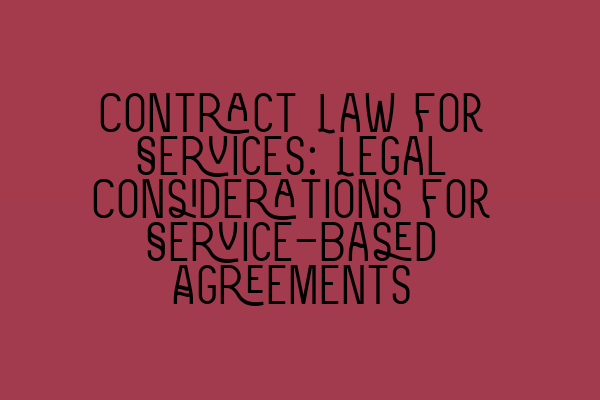Contract Law for Services: Legal Considerations for Service-Based Agreements
When it comes to entering into service-based agreements, it is crucial to have a comprehensive understanding of contract law. As a solicitor, it is our role to provide you with the necessary legal insights to protect your interests and ensure a smooth and fair business transaction.
In this blog post, we will discuss the legal considerations that you need to be aware of when entering into service agreements. From the essentials of contract formation to the key clauses to include, we’ve got you covered. So, let’s dive in!
1. Contract Formation:
Before we delve into the specifics of service-based agreements, it is essential to understand the basics of contract formation. A contract is formed when there is an offer, acceptance, consideration, and an intention to create legal relations.
However, in service agreements, it is often challenging to determine whether there has been a valid offer and acceptance. Therefore, it is crucial to document all communications and negotiations to establish a clear understanding between the parties.
To learn more about contract formation and essential legal principles, check out our related article: SQE 1 Practice Exam Questions.
2. Scope of Services:
The scope of services is a critical aspect of any service-based agreement. It outlines the specific tasks, responsibilities, and deliverables expected from the service provider. The scope should be clearly defined to avoid any confusion or disputes in the future.
When drafting the scope of services, it is important to be detailed and specific. This will help prevent any misinterpretations or misunderstandings. Always ensure that both parties are clear on what is expected to avoid any potential conflicts.
For more practical tips on drafting service agreements and important clauses to include, take a look at our related article: SQE 1 Practice Mocks FLK1 FLK2.
3. Payment Terms:
The payment terms in a service-based agreement dictate how and when the service provider will be compensated for their services. It is crucial to be clear and precise when outlining these terms to avoid any disputes or uncertainties.
Some important payment terms to consider include the payment schedule, invoicing requirements, late payment penalties, and any additional expenses that may be incurred during the provision of services.
For a comprehensive guide on structuring payment terms in service agreements, you may find our related article helpful: SQE 2 Preparation Courses.
4. Intellectual Property Rights:
Intellectual property rights are often a key concern when it comes to service-based agreements. It is important to clearly define who will retain ownership of any intellectual property developed during the provision of services.
Depending on the nature of the services, it may be necessary to include specific clauses such as non-disclosure agreements or confidentiality provisions to protect sensitive information.
To gain a deeper understanding of how to protect your intellectual property rights, check out our related article: SQE 1 Preparation Courses.
5. Termination and Dispute Resolution:
No matter how well-drafted a service agreement is, disputes and terminations may arise. It is crucial to have provisions in place that outline the process for terminating the agreement and resolving any disagreements.
Consider including clauses related to termination notice periods, grounds for termination, and the process for resolving disputes (such as mediation or arbitration).
For more information on effective dispute resolution strategies, our related article may provide valuable insights: SRA SQE Exam Dates.
Conclusion:
Service-based agreements require careful consideration of the legal aspects involved. Having a solid understanding of contract law and incorporating the necessary clauses can help protect your interests and prevent potentially costly disputes.
At SQE Contract Law, we are here to provide expert legal advice and support for all your service agreement needs. Contact us today to ensure you have the proper legal protections in place.
